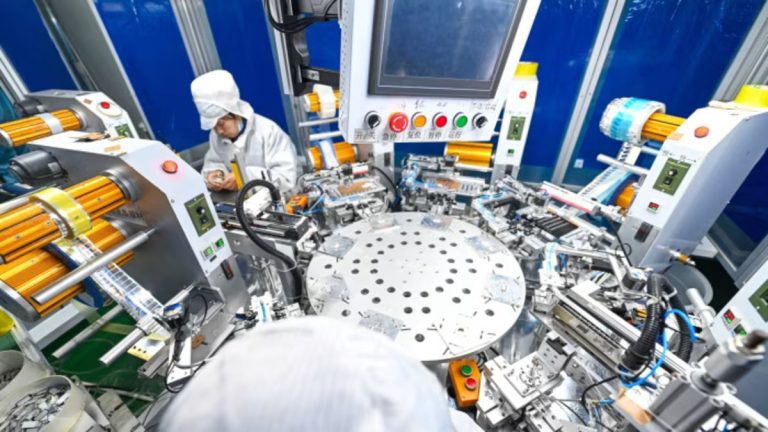🎧 Listen to This Article
Chipmakers Lead Tech Stock Dip Amid Trump’s China Export Curbs
On April 16, 2025, the global tech sector faced a significant setback after President Donald Trump’s administration imposed new restrictions on semiconductor exports to China. Nvidia Corp. and Advanced Micro Devices Inc. (AMD) were among the hardest hit, with both companies warning of substantial financial impacts from the new curbs. ASML Holding NV also saw a steep drop in its stock price after reporting disappointing earnings results.
Tech Stocks Suffer Losses
The S&P 500 Index dropped 1.43%, while the Nasdaq 100 Index saw a larger dip of 2.21%. Nvidia’s stock fell by up to 7%, following an announcement that it would report about $5.5 billion in related charges during the fiscal first quarter. AMD also reported a sharp decline, dropping 6.01% after revealing that it anticipates taking a charge of up to $800 million. ASML’s stock plummeted 6.09%, and the Philadelphia Stock Exchange Semiconductor Index fell 4.02% in total.
These losses signal a significant blow to the tech sector, which has been a key driver of broader market gains over the past few years.
The Trump administration’s new restrictions prohibit the sale of critical semiconductors to China, including Nvidia’s H20 chip and AMD’s MI308 products, unless the companies secure a special license. This marks the latest escalation in the ongoing tech trade conflict between the U.S. and China, and it has raised concerns among investors about the potential for further disruptions in the global tech supply chain.
Dan Ives, a senior equity research analyst at Wedbush Securities, described the restrictions as a “shot across the bow,” emphasizing that the U.S. government’s stance effectively prevents Nvidia and other tech giants from fully accessing the Chinese market.
Tech Stocks Take a Hit
The news sent ripples through the market, affecting large-cap tech stocks that had been key to the equity rally in recent years. Dan Greenhaus, chief strategist at Solus Alternative Asset Management, expressed concern over the potential fallout:
“Considering how important large-cap tech has been to the broader equity rally these last few years, it goes without saying that these headlines are worrisome.”
The World Trade Organization (WTO) also downgraded its global trade forecast for 2025, citing U.S. tariffs and the escalating trade conflict as key factors behind the expected 0.2% contraction in merchandise trade this year.
In addition to the semiconductor restrictions, ASML added to the tech sector’s woes with a disappointing earnings report. The company’s order volume missed analyst expectations, and its leadership expressed uncertainty about how recent tariff hikes would impact its operations in the coming months.
The combination of these challenges has created a cloud of uncertainty over the semiconductor and tech industries, raising concerns about supply chain disruptions and trade barriers in the near future.
Global Trade Uncertainty
In the midst of these developments, there were some signs of hope in trade talks with China. The Chinese government signaled a willingness to engage in negotiations with the Trump administration, provided that U.S. officials moderate their critical rhetoric.
However, despite these diplomatic gestures, the broader trade environment remains uncertain, especially with the risk of additional tariffs affecting both sides.
A Mixed Picture: While the tech sector has faced a sharp downturn, broader U.S. retail sales saw a substantial increase in March, particularly driven by a spike in car purchases and electronics, as consumers rushed to buy products ahead of tariff hikes.
Hertz and JB Hunt: Among individual stock movements, Hertz Global Holdings saw a boost after Pershing Square Capital Management disclosed a large stake in the car rental company. Meanwhile, JB Hunt Transport Services saw its stock dip as analysts flagged ongoing concerns about the tariff impact on the trucking industry and the broader economy.
A Challenging Road Ahead for Tech Stocks
As the global tech sector adjusts to new trade restrictions and evolving tariff landscapes, Nvidia, AMD, and ASML are bracing for a challenging year. The latest developments underline the fragile nature of international trade relations and the tech sector’s vulnerability to geopolitical tensions. Investors will be watching closely to see how the situation unfolds in the coming months.
For further details, clarification, contributions, or any concerns regarding this article, please contact us at editorial@tax.news. We value your feedback and are committed to providing accurate and timely information. Please note that our privacy policy will handle all inquiries



